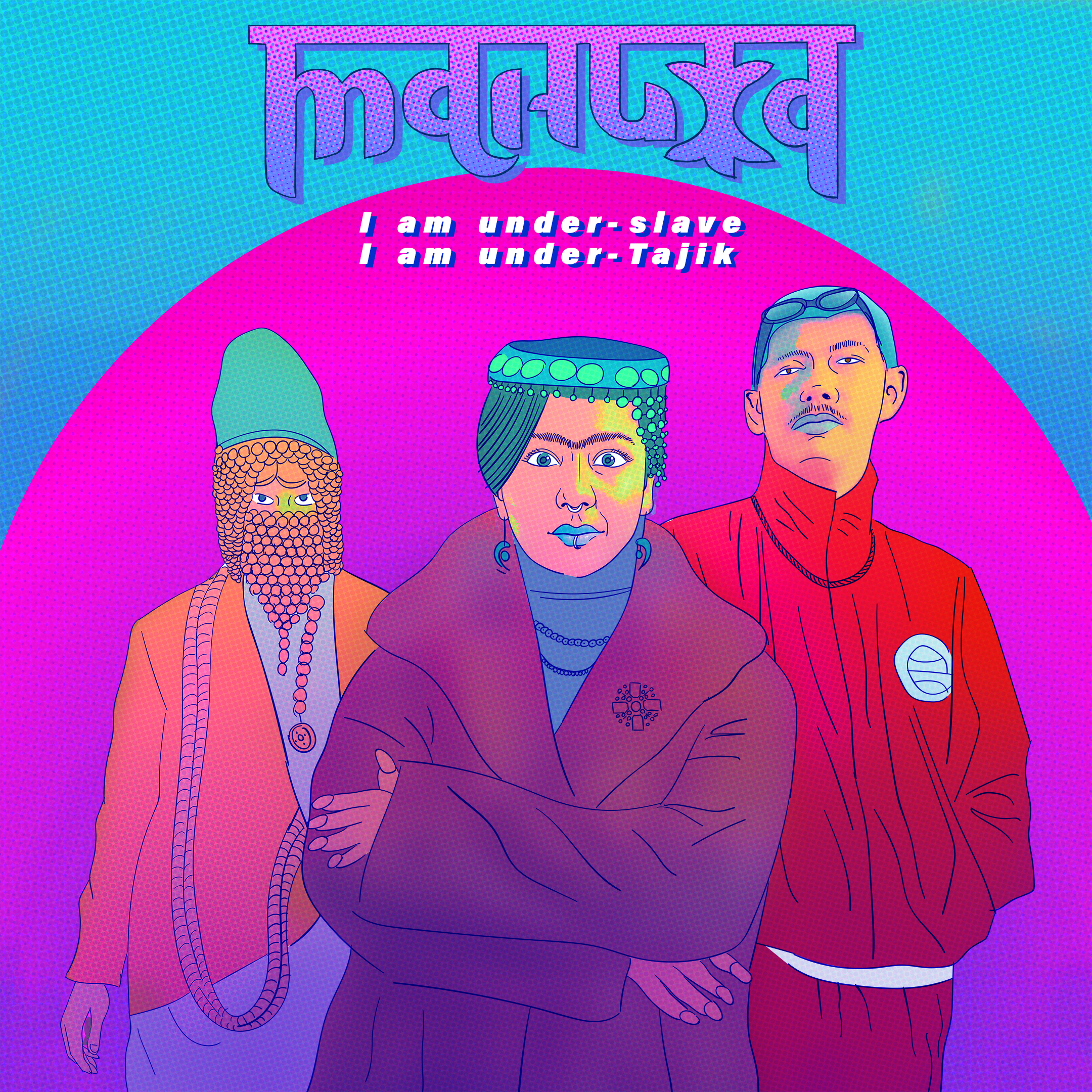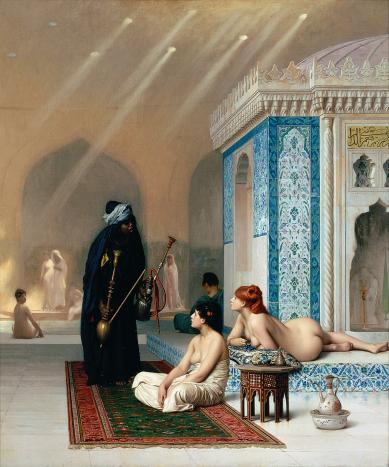Challenging Orientalism Pt. 5
Six international curators from the Norient community have researched contemporary music videos that re-imagine, parody, or deconstruct Orientalism. The final selection is presented in the virtual exhibition «DisOrient: Welcome to the Hall of Mirrors», which is part of the German festival Mannheimer Sommer. Here is the shortlist by curator and activist Georgy Mamedov, who focuses on videos from Central Asia.
The Orientalist depiction of Central Asian cultures originates in ethnographic works, military and colonial administration reports, and artistic production during the Russian colonization of the region in the late 18th and throughout the 19th century. This depiction essentially reproduces Western European Orientalist clichés about the Middle East. These clichés always form quite a paradoxical mix of mutually exclusive characteristics that the Orientalist gaze ascribes to the non-Westerners such as excessiveness (colors, odors, sounds) and scarcity (hygiene); aggressiveness (of warriors) and submissiveness (of women); irrationality and artifice.
Between «Authenticity» and «Backwardness»
The Soviet period adds another layer to the Orientalist palimpsest in Central Asia. Even though the Soviets strove to radically break up with the legacy of the Russian Empire and launched a number of public campaigns against colonial and Orientalist policies and practices, the power dynamic of the multiethnic and multicultural USSR produced its own Orientalist dichotomies in relation to Central Asia, such as backward/progressive; traditional/modern; authentic/secondary. Official Soviet discourse celebrated internationalism (or «the friendship of peoples» in its late Soviet version) and supported ethnically marked cultural expressions. Indeed, different forms of national cultures that are perceived as «authentic» today came out of the Socialist Realism formula of cultural production, «national in form, socialist in content».
At the same time, in everyday life many ethnically marked cultural practices, including speaking native languages, were considered as signs of «backwardness». To be modern and progressive, and therefore avoid Orientalization, Central Asian people had to distance themselves from «excessive» ethnic self-representation and adopt Russian language, urban lifestyle, and westernized cultural habits. In the post-Soviet period, this dynamic changed its course to the opposite direction: Nationalist regimes present self-Orientalizing cultural practices as «authentic». Conservative political forces appeal to preservation and celebration of authenticity of ethnic cultures as the only remedy against corrupting globalization and westernization.
In contemporary neoliberal capitalism, the Orientalist discourse attains new political-economic dimensions. Labor migration to Russia is the only source of livelihoods for millions of Kyrgyz, Tajiks, and Uzbeks who face both institutionalized and everyday discrimination, xenophobia, and violence. Remittances from labor migrants form from 30 to 40 percent of the GDP in Kyrgyzstan and Tajikistan. Chinese and Western capital constantly expands in the region and takes over local mining, petroleum, logistics, construction, and other industries.
Challenging Orientalism
Orientalism has been consistently challenged in Central Asia in academic writing, media discourses, and contemporary visual art. Only recently, popular music became another terrain for critical reflection of Orientalist representations. All five music videos in this selection challenge Orientalism in different ways. The first three clips directly engage with various aspects of Orientalism. Their authors also explicitly address their critical message to different subjects of the Orientalist gaze. Tajik-Russian singer Manizha confronts the cultural stereotypes, xenophobia, and everyday racism experienced by Central Asians in Russia. Anuar Duisenbinov mocks clumsy attempts of the Kazakh state to maintain a fragile balance between hyper-modernization and preservation of national authenticity. Saodat Ismailova, an Uzbek visual artist and film director based in Paris, redefines traditional Central Asian music and forms of its performance as sources of women’s empowerment.
The last two videos by Kazakh pop singer Moldonazar and the Kyrgyz K-pop style girl band Love iz do not contain explicit political or critical messages. They can be viewed as cultural productions that evolve out of the contradictory cultural landscape of Central Asia. They embrace «organically» (not in an agitated political way) the complex, mixed, contested condition of Central Asia being «in between» – «between Western Europe and Western China» – as the line goes in the lyrics of Anuar Duisenbinov.
Music: Manizha
Video: Artemii Ortus
Track: Under-Slav (Nedoslavianka) (Tajikistan/Russia, 2019)
With this most recent self-release, Tajik-Russian singer Manizha gained repute as a vocal advocate of the Central Asian migrants in Russia. Manizha, who was born in Tajikistan but lived all her life in Moscow, masterfully plays with the Russian exoticizing clichés about Tajiks and Central Asians. She takes these representations to extreme excess and turns them into subversive kitsch. However, her Under-Slav not only denounces and mocks Russian xenophobic stereotypes, but it also confronts Tajik nationalists in their demands for ethnic purity, authenticity, and unconditional Tajikness. «Under-Slav I’m and under-Tajik», she sings. Blending languages, music styles, and ethnic cultural expressions, Manizha celebrates her mixed, non-authentic, non-pure and «dirty» identity.
It is important to note that «Nedoslavyanka» is a very personal song, or rather an expression of the powerful feminist motto of the personal as political. Manizha started her career in music as a teenager under the stage name Rukkola (Russian for arugula). The Russian producers with whom she worked told her that a girl with the name Manizha could only sing Oriental songs and if she wanted to perform Western-style music, she had to pick a stage name. When she was twenty, Manizha decided to end her career as Rukkola and cut all ties with professional producers. She moved to Instagram and stared recording short music videos under her real name. Translating her personal experience of Orientalization in the Russian popular music scene into musical and visual form, Manizha also makes a political statement that resonates with the experience of millions of Tajik and Central Asian migrants in Russia.
Music: Anuar Duisenbinov (lyrics, voice), Rustem Myrzakhmetov
Video: Saule Dyussenbina
Track: Ruhani Kangaroo (Kazakhstan, 2019)
«Ruhani Zhangyru» (literally, renovation of the spirit) is the title of the Kazakh national program of modernization launched by the former president and the national leader Nursultan Nazarbayev, which aims to achieve simultaneous hyper-modernization and preservation of national authenticity of the Kazakh culture. Anuar Duisenbinov, poet, musician, and organizer of underground electronic music parties in Almaty, plays with words and turns «Zhangyru» into a «Kangaroo» that gallops through the vast steppe from Western Europe to Western China and back in search of the eternal spirit.
Music: Dmitri Yanov Yanovsky
Video: Saodat Ismailova
Work: Qyrq Qyz (86 minutes, Uzbekistan, 2018)
In this all-female performative retelling of the medieval epic tale, Saodat Ismailova redefines the meanings of «traditional» and «ethnic». Ismailova avoids irony, mockery, and deconstruction of the traditional culture. Instead, she treats tradition with acute sensitivity and delicacy, which at the same time does not mean that her approach is deprived of critical distance. Juxtaposing traditional sounds with electronic and meditative video footage, the artist strives to actualize the philosophical and emancipatory potential of the traditional practice of bard singing. Ismailova challenges the Orientalist progressivist gaze that views native cultural expressions as exclusively shallow and backward.
Music: Galymzhan Moldanazar
Video: Shapagat Orynbaev
Track: Akpen Birge (Kazakhstan, 2013)
Moldonazar does not exacerbate Orientalist oppositions, nor does he denounce them. He does something much more subtle and radical. In his sounds and clips full of nostalgic vibes, he offers dialectical resolution to these conflicts. Kazakh and Soviet, Kazakh and global are not the oppositions anymore. The Soviet becomes Kazakh and the Kazakh becomes global.
Music: Love iz
Video: Fam Entertainment
Track: OA (Kyrgyzstan, 2019)
Girl band Love iz is the most popular Kyrgyz K-popish project. The global popularity of K-pop provoked demand in the localized versions of the original style. Love iz, like all other local bands, sings in Kyrgyz, while they themselves and their audiences are Russophone. K-pop is a marker of contemporaneity for the Kyrgyz Generation Z. What makes this trend interesting from the Orientalist perspective is that K-pop is not at all a Western phenomenon. Even though it blends «Western» musical styles, it is not only the sound that defines K-pop – a very paradoxical phenomenon, especially in its various local versions. In Kyrgyzstan, K-pop subculture can be viewed as a space of productive dialogue between global and local, Asian and Western, alternative and mainstream, subversive and conformist.
This playlist has been compiled in the context of «DisOrient: Welcome to the Hall of Mirrors». A virtual music video exhibition by Norient for Mannheimer Sommer (July 12–22, 2020). Because of the Corona pandemic, the festival took place as a virtual event.
Biography
Published on June 19, 2020
Last updated on September 25, 2020
Topics
Watch how cutting-edge music from Brazil to Singapore is represented in moving images.
From Beyoncés colonial stagings in mainstream pop to the ethical problems of Western people «documenting» non-Western cultures.
Does one really need the other in order to understand oneself?
Why is a female Black Brazilian MC from a favela frightening the middle class? Is the reggaeton dance «perreo» misogynist or a symbol of female empowerment?
Why Asia is not a continent and how the aesthetics of the NON Worldwide collective create new utopian notions of multi-centred origins.
What happens, when artists move from one to another country? For example, when an Arab artist replaces the big tractors in her the village with big jeeps of the West.
Snap

